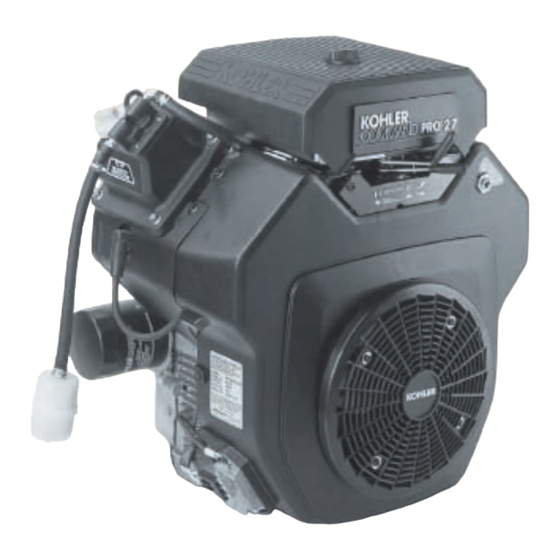Kohler Command PRO CH18 Instrukcja obsługi - Strona 5
Przeglądaj online lub pobierz pdf Instrukcja obsługi dla Silnik Kohler Command PRO CH18. Kohler Command PRO CH18 21 stron. Command series
Również dla Kohler Command PRO CH18: Instrukcja obsługi (21 strony), Instrukcja obsługi (21 strony), Instrukcja obsługi (8 strony), Instrukcja obsługi (21 strony), Instrukcja obsługi (24 strony), Instrukcja obsługi (14 strony)

Oil Recommendations
Using the proper type and weight of oil in the
crankcase is extremely important. So is checking oil
daily and changing oil regularly. Failure to use the
correct oil, or using dirty oil, causes premature engine
wear and failure.
Oil Type
Use high quality detergent oil of API (American
Petroleum Institute) service class SG, SH, SJ, or
higher. Select the viscosity based on the air
temperature at the time of operation as shown in the
following table.
**
*Use of synthetic oil having 5W-20 or 5W-30 rating is
acceptable, up to 4°C (40°F).
**Synthetic oils will provide better starting in extreme
cold below -23°C (-10°F).
Figure 3. Viscosity Grades Table.
NOTE: Using other than service class SG, SH, SJ or
higher oil or extending oil change intervals
longer than recommended can cause engine
damage.
NOTE: Synthetic oils meeting the listed
classifications may be used with oil changes
performed at the recommended intervals.
However to allow piston rings to properly
seat, a new or rebuilt engine should be
operated for at least 50 hours using standard
petroleum based oil before switching to
synthetic oil.
A logo or symbol on oil containers identifies the API
service class and SAE viscosity grade. See Figure 4.
Figure 4. Oil Container Logo.
*
Refer to Maintenance Instructions beginning on
page 8 for detailed oil check, oil change, and oil filter
change procedures.
Fuel Recommendations
WARNING: Explosive Fuel!
Gasoline is extremely flammable and its vapors can explode
if ignited. Store gasoline only in approved containers, in
well ventilated, unoccupied buildings, away from sparks or
flames. Do not fill the fuel tank while the engine is hot or
running, since spilled fuel could ignite if it comes in contact
with hot parts or sparks from ignition. Do not start the
engine near spilled fuel. Never use gasoline as a cleaning
agent.
General Recommendations
Purchase gasoline in small quantities and store in
clean, approved containers. A container with a
capacity of 2 gallons or less with a pouring spout is
recommended. Such a container is easier to handle and
helps eliminate spillage during refueling.
Do not use gasoline left over from the previous season,
to minimize gum deposits in fuel system and to ensure
easy starting.
Do not add oil to the gasoline.
Do not overfill the fuel tank. Leave room for the fuel to
expand.
Fuel Type
For best results use only clean, fresh, unleaded
gasoline with a pump sticker octane rating of 87 or
higher. In countries using the Research method, it
should be 90 octane minimum.
Unleaded gasoline is recommended as it leaves less
combustion chamber deposits and reduces harmful
exhaust emissions. Leaded gasoline is not
recommended and must not be used on EFI engines,
or on other models where exhaust emissions are
regulated.
Gasoline/Alcohol blends
Gasohol (up to 10% ethyl alcohol, 90% unleaded
gasoline by volume) is approved as a fuel for Kohler
engines. Other gasoline/alcohol blends including E20
and E85 are not to be used and not approved. Any
failures resulting from use of these fuels will not be
warranted.
Gasoline/Ether blends
Methyl Tertiary Butyl Ether (MTBE) and unleaded
gasoline blends (up to a maximum of 15% MTBE by
volume) are approved as a fuel for Kohler engines.
Other gasoline/ether blends are not approved.
5
